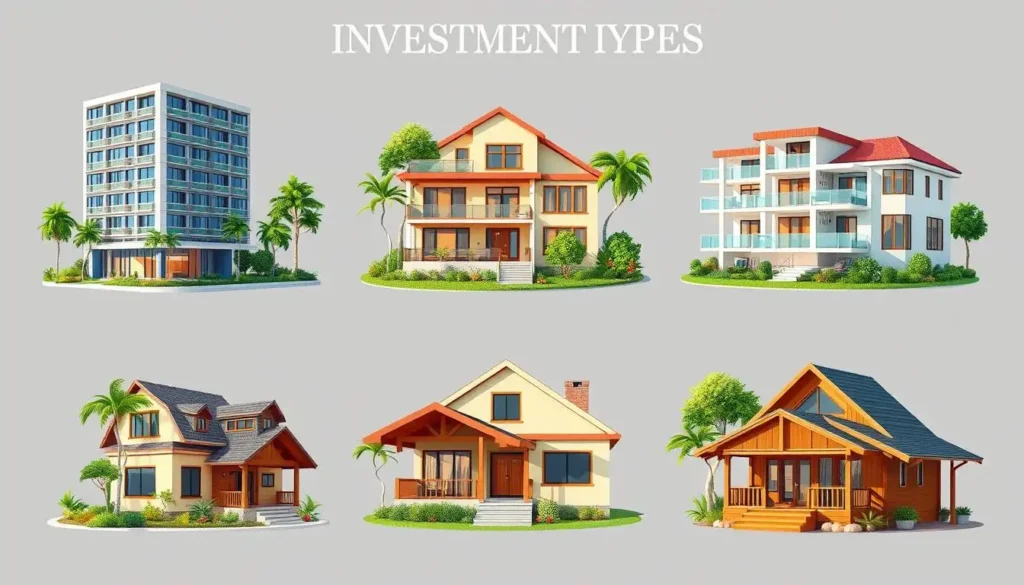Physical Address
304 North Cardinal St.
Dorchester Center, MA 02124
Physical Address
304 North Cardinal St.
Dorchester Center, MA 02124
Discover the most lucrative best real estate investments to grow your wealth. Learn expert strategies for residential, commercial, and REITs to maximize your ROI

Real estate investing offers many chances for high returns and steady growth. You can invest in apartment buildings, tiny homes, vacation rentals, and commercial properties. Each option suits different goals and risk levels. We’ll look at the best property types and strategies to boost your real estate wealth.
Apartment buildings, for example, earn more monthly income than single-family homes. They are always in demand, making them a favorite among investors. Tiny homes, like mobile homes and arched cabins, are cheaper to buy and can still make a profit. Vacation rentals, such as lakeside cabins and beach houses, have high daily rental rates, leading to great returns.
Commercial properties, like retail stores and self-storage units, make more money per square foot than homes. Self-storage units, in particular, are among the top real estate investments. They have an average ROI of 41%.
Successful real estate investing starts with market research and analysis. The Federal Reserve’s interest rate hikes affect the real estate market trends. It’s key to look at local jobs, salaries, demographics, house prices, and supply-demand balance.
Knowing your investment risk is also vital. Your risk level depends on your age, finances, and experience. Good risk assessment strategies help you deal with real estate’s challenges.
Real estate investing is a long-term property planning effort. Creating a timeline that fits your strengths, like property management or renovation, boosts your chances of success.
“Real estate investment offers long-term safety, requiring thorough property and location research.”
Smart investors spread their portfolios and look into REITs and real estate mutual funds. This helps reduce risk and increase profits.
Some property types are better than others for making money in real estate. Apartment buildings and vacation rentals are among the best. They can bring in a lot of money and steady cash flow.
Apartment buildings are a top choice. They make more money each month than single-family homes. They’re also in high demand because of rising living costs. Plus, you only need a small downpayment to start.
Tiny homes like mobile homes and arched cabins are also good. They’re cheap to start with and can still make decent money. They’re perfect for those with little money to begin with.
Vacation rentals like lakeside cabins and beach houses are great too. They make a lot of money during busy times. This is because people pay a lot to stay there.
Retail stores and commercial spaces also make a lot of money. They can earn more per square foot than homes. Self-storage units are even better, with a return on investment of 41%.
Choosing the right real estate investments depends on several things. You need to know the market, your strategy, and how much risk you can take. By picking the right properties, you can build a strong and profitable real estate portfolio.

For savvy real estate investors, some markets are especially promising. The sun-kissed coasts of Florida, the booming Texas economy, and the thriving North Carolina region are top choices. These places offer great opportunities to grow your wealth through smart property investments.
The Florida real estate market attracts many investors. It’s expected to see 5.8% population growth by 2030. The state’s strong economy, with tourism, healthcare, and tech sectors, and no state income tax, make it appealing. With rising home values and rents, Florida real estate investments could yield big returns.
The Texas property market is a favorite among investors. It has a booming economy, a business-friendly environment, and is expected to grow to 36-44 million by 2060. From Dallas and Houston to the suburbs, Texas offers diverse investment opportunities with high returns.
North Carolina‘s real estate market is gaining attention. It’s expected to see 9.5% population growth from 2020 to 2030. The state’s diverse economy, including tech, healthcare, finance, and manufacturing, supports growth. With a median home value of $335,760 and average one-bedroom rent of $1,400, North Carolina is attractive for investors looking for high returns.
| Market | Population | Gross Rental Yield | Vacancy Rate | Housing Price Index 5-Year Growth | Median Home Sold Price |
|---|---|---|---|---|---|
| Athens, Georgia | 128,561 | 40% | 48% | 9 | $328,265 |
| Savannah, Georgia | 148,004 | 49% | 14% | 22 | $327,125 |
| Waco, Texas | 143,984 | 55% | 82% | 79 | $252,500 |
| Jacksonville, Florida | 971,319 | 44% | 4% | 99 | $297,538 |
| Lakeland, Florida | 120,071 | 52% | 57% | 7 | $314,800 |
| Oshkosh, Wisconsin | 65,948 | 43% | 17% | 71 | $222,366 |
| El Paso, Texas | 677,456 | 61% | 74% | 3 | $250,570 |

“The combination of favorable population growth, robust economic activity, and attractive tax policies make Florida, Texas, and North Carolina standout destinations for real estate investors seeking high returns.”
Real estate investments come in two main types: commercial and residential. Each has its own benefits and challenges. Knowing the differences helps investors make smart choices and increase their earnings.
Commercial properties, like retail stores and self-storage units, often earn more per square foot than homes. Retail stores can be pricey but offer high commercial property ROI. Self-storage units have a 41% ROI, one of the best in the market. Homes, such as apartments and vacation rentals, provide steady income and are in high demand. Apartments earn more than single-family homes, and vacation rentals can see daily income boosts.
Commercial properties need a big initial investment but can earn more due to long leases and high appreciation. Residential properties are easier to start with and cost less. They include single-family homes, duplexes, and small apartment buildings.
| Characteristic | Commercial Real Estate | Residential Real Estate |
|---|---|---|
| Initial Investment | Higher | Lower |
| Rental Yields | Higher | Lower |
| Lease Terms | Longer (5-10+ years) | Shorter (typically 1 year) |
| Appreciation Potential | Significant | Moderate |
| Tenant Turnover | Lower | Higher |
| Tax Implications | Complex, with higher property taxes | Simpler, with potential for tax exemptions |
| Management Complexity | Higher, due to diverse tenant issues | Lower, with more straightforward tenant management |
When choosing between commercial vs. residential investment, think about your goals, how much risk you can take, and what resources you have. Commercial properties might offer higher returns but need a big investment and can be harder to manage. Residential properties are more stable and easier to get into, making them a good choice for many.
Savvy real estate investors know that to achieve maximum returns, they must carefully evaluate and implement various investment strategies. From the thrilling world of house flipping to the steady income of long-term investments, the options are vast and diverse.
Property flipping, or house flipping, involves purchasing undervalued properties, renovating them, and quickly reselling for a profit. This fast-paced strategy requires deep market knowledge, renovation expertise, and impeccable timing. With over $45 billion in institutional money flowing into the single-family rental (SFR) and build-to-rent sectors in 2021, the potential for house flipping remains strong, particularly in high-growth markets.
For investors seeking a more long-term, passive approach, the buy-and-hold strategy has proven its worth. By purchasing properties and holding them for an extended period, investors can benefit from steady rental income and potential property value appreciation. According to the Federal Reserve of St. Louis, house prices have generally risen over time, making this a compelling option for those with a patient, disciplined mindset.
Real estate wholesaling offers a unique opportunity for savvy investors to act as middlemen, connecting buyers and sellers without the need for direct property ownership. By negotiating purchase contracts below market value and then assigning those contracts to other buyers, wholesalers can earn significant profits without the risks and responsibilities of property management.
Each investment strategy has its own merits, risks, and nuances. Successful real estate investors carefully evaluate their skills, risk tolerance, and financial situation to determine the most suitable approach for maximizing their returns.
“The key to successful real estate investing is to find the right balance between risk and reward, and to constantly adapt to changing market conditions.”
For those who want less work in real estate, there are options like Real Estate Investment Trusts (REITs) and Real Estate Investment Groups (REIGs). REITs work like mutual funds, letting investors get into real estate without owning properties. They often do better than stocks, with self-storage properties showing an average return of 18.8% from 1994 to 2021.
REIGs let investors join forces while still having some say in property management. They’re great for those who want to invest in real estate without the hassle. Plus, they often have lower investment requirements, helping to spread out risk and diversify your portfolio.
Also, REITs and REIGs don’t move with the stock and bond markets as much. This can help keep your investments stable during tough times. They also offer a way to fight inflation with their dividends and property value growth. This makes them appealing for steady income and long-term growth.
Top choices include apartment buildings, tiny homes, and vacation rentals. Retail stores and self-storage units are also good. These properties offer high returns due to steady demand and affordable costs.
Look at national trends like interest rates. Also, consider local factors such as employment and average salaries. House prices and supply and demand are also important.
Investors should think about their age, financial situation, and experience. A long-term plan is key for real estate, as it’s not a quick investment.
Florida is a top choice due to its growing population and economy. Texas is known for its strong economy and business-friendly environment. North Carolina is expected to grow significantly and has a diverse economy.
Commercial properties like retail stores and self-storage units have higher income per square footage. But, residential properties like apartments and vacation rentals also offer steady income and are in demand.
Popular strategies include flipping, buy-and-hold, and wholesaling. Each has its own risks and rewards. Investors should choose based on their skills, risk tolerance, and financial situation.
Options include Real Estate Investment Trusts (REITs) and Real Estate Investment Groups (REIGs). These allow investors to participate in real estate without managing physical properties.